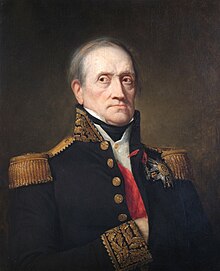
Back جان دو ديو سول Arabic جان دو ديو سول ARZ Нікаля Жан дэ Дзьё Сульт Byelorussian Nicolas Jean de Dieu Soult Catalan Nicolas Jean de Dieu Soult Czech Nicolas Jean-de-Dieu Soult, duc de Dalmatie German Ζαν Σουλτ Greek Jean-de-Dieu Soult Esperanto Jean-de-Dieu Soult Spanish Nicolas Jean de Dieu Soult Basque
Jean-de-Dieu Soult | |
|---|---|
 Portrait by George Healy, 1840 | |
| Prime Minister of France | |
| In office 29 October 1840 – 18 September 1847 | |
| Monarch | Louis Philippe I |
| Preceded by | Adolphe Thiers |
| Succeeded by | François Guizot |
| In office 12 May 1839 – 1 March 1840 | |
| Monarch | Louis Philippe I |
| Preceded by | Louis-Mathieu Molé |
| Succeeded by | Adolphe Thiers |
| In office 11 October 1832 – 18 July 1834 | |
| Monarch | Louis Philippe I |
| Preceded by | Casimir Perier |
| Succeeded by | Étienne Maurice Gérard |
| Minister of War | |
| In office 29 October 1840 – 10 November 1845 | |
| Prime Minister | Himself |
| Preceded by | Amédée Despans-Cubières |
| Succeeded by | Alexandre Moline de Saint-Yon |
| In office 17 November 1830 – 18 July 1834 | |
| Prime Minister | Jacques Laffitte Casimir Perier |
| Preceded by | Étienne Maurice Gérard |
| Succeeded by | Étienne Maurice Gérard |
| In office 26 November 1814 – 11 March 1815 | |
| Prime Minister | Pierre Louis Jean Casimir de Blacas |
| Preceded by | Pierre Dupont de l'Étang |
| Succeeded by | Henri Clarke |
| Personal details | |
| Born | 29 March 1769 Saint-Amans-la-Bastide, France |
| Died | 26 November 1851 (aged 82) Saint-Amans-la-Bastide, Tarn, France |
| Political party | Resistance Party |
| Spouse |
Jeanne-Louise-Elisabeth Berg
(m. 1796; died 1851) |
| Children | 3 |
| Profession | Military officer |
| Signature | |
| Military service | |
| Allegiance | |
| Branch/service | Army |
| Years of service | 1785–1815 |
| Rank | Marshal of the Empire |
| Unit |
|
| Battles/wars | |
Marshal General Jean-de-Dieu Soult,[1][2] 1st Duke of Dalmatia (French: [ʒɑ̃dədjø sult]; 29 March 1769 – 26 November 1851) was a French general and statesman. He was a Marshal of the Empire during the Napoleonic Wars, and served three times as President of the Council of Ministers (prime minister) of France.
Son of a country notary from southern France, Soult enlisted in the French Royal Army in 1785 and quickly rose through the ranks during the French Revolution. He was promoted to brigadier general after distinguishing himself at the Battle of Fleurus in 1794, and by 1799 he was a division general. In 1804, Napoleon made Soult one of his first eighteen Marshals of the Empire. Soult played a key role in many of Napoleon's campaigns, most notably at the Battle of Austerlitz, where his corps delivered the decisive attack that secured French victory. He was subsequently created Duke of Dalmatia and from 1808, he commanded French forces during the Peninsular War. Despite several initial victories, for instance at the Battle of Ocaña, Soult was eventually outmaneuvered and driven out of Spain by the coalition forces under the command of Arthur Wellesley (later Duke of Wellington). He was again defeated by Wellington at Toulouse in 1814, days after Napoleon's first abdication. Soult declared himself a royalist following the Bourbon Restoration, but rejoined Napoleon during the Hundred Days. He was Napoleon's chief of staff during the Waterloo campaign in 1815, where the emperor suffered a final defeat.
Following the second restoration, Soult went into exile in Germany. In 1819 he was recalled to France and returned to royal favour, and in 1830 he was made minister of war after the July Revolution. Soult oversaw reforms of the French military and was responsible for the creation of the French Foreign Legion. Under King Louis Philippe, he was three times French prime minister from 1832 to 1834, almost a year between 1839 and 1840 and from 1840 to 1847. In 1847, he was awarded the title Marshal General of France. Soult again declared himself a Republican after Louis Philippe's overthrow in the French Revolution of 1848. He died in 1851.
- ^ Although many sources give Soult's first name as Nicolas, that does not appear on his birth certificate: "Le prénom de Soult n'est PAS Nicolas", from Soult, Maréchal d'Empire et homme d'État by Nicole Gotteri (édition de la Manufacture). See page 20: "Il est donc parfaitement clair que le Maréchal Soult se prénommait Jean de Dieu. L'indu ajout de "Nicolas" n'est que le résultat des calomnies déclenchées à la suite de la campagne du Portugal [...]". Kaga- (d) 29 December 2011 at 13:26 (CET)
- ^ R. Hayman, Soult — Napoleon's Maligned Marshal (London: 1990), opposite p. 96